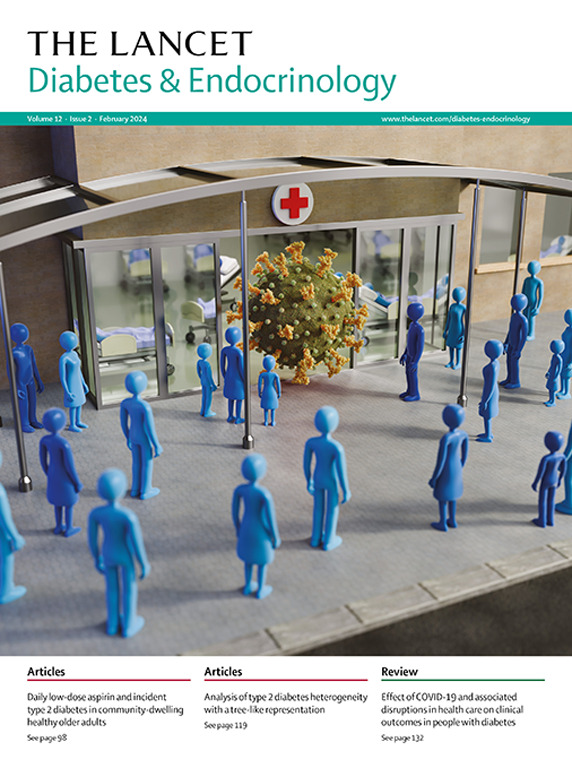Estimating direct tissue effects versus weight loss effects of incretin-based drugs for obesity on various chronic conditions
IF 44
1区 医学
Q1 ENDOCRINOLOGY & METABOLISM
引用次数: 0
Abstract
The extent to which newer, incretin-based drugs for obesity improve disease outcomes via weight loss versus the direct effects of these drugs is the subject of intense interest. Although reductions in major adverse cardiovascular events appear to be predominantly driven by the direct tissue effects of such drugs, the associated weight loss effects must be relevant to the benefits observed in other major outcomes, albeit to differing extents. In this Personal View, we draw on evidence to support that weight loss is at least partly responsible (albeit to differing extents) for the reported benefits of incretin-based drugs for obesity in people living with heart failure with preserved ejection fraction, hypertension, chronic kidney disease, and type 2 diabetes. Concurrently, we propose that drug-induced weight loss is largely responsible for the reported improvements in osteoarthritis, obstructive sleep apnoea, and metabolic dysfunction-associated steatohepatitis outcomes. However, more evidence is needed to solidify these observations, including, when possible, trials comparing the effects of incretin-based drugs for obesity with calorie-reduced diets on both outcomes and mechanistic pathways. Such evidence has implications for public health and the design of future trials of novel drugs for obesity.估计以肠促胰岛素为基础的肥胖药物对各种慢性疾病的直接组织效应与减肥效应
较新的、以肠促胰岛素为基础的肥胖药物与这些药物的直接作用相比,在多大程度上通过减轻体重来改善疾病结局,这是人们非常感兴趣的话题。虽然主要不良心血管事件的减少似乎主要是由这些药物的直接组织效应驱动的,但相关的体重减轻效应必须与在其他主要结果中观察到的益处相关,尽管程度不同。在本个人观点中,我们利用证据来支持体重减轻至少是部分原因(尽管程度不同),以肠促胰岛素为基础的药物对患有心力衰竭并保留射血分数、高血压、慢性肾脏疾病和2型糖尿病的肥胖患者的益处。同时,我们提出药物诱导的体重减轻在很大程度上是报道的骨关节炎、阻塞性睡眠呼吸暂停和代谢功能障碍相关的脂肪性肝炎结果改善的原因。然而,需要更多的证据来巩固这些观察结果,包括在可能的情况下,比较以肠促胰岛素为基础的肥胖药物与低热量饮食对结果和机制途径的影响的试验。这样的证据对公共健康和设计未来的新型肥胖药物试验具有启示意义。
本文章由计算机程序翻译,如有差异,请以英文原文为准。
求助全文
约1分钟内获得全文
求助全文
来源期刊

The Lancet Diabetes & Endocrinology
ENDOCRINOLOGY & METABOLISM-
CiteScore
61.50
自引率
1.60%
发文量
371
期刊介绍:
The Lancet Diabetes & Endocrinology, an independent journal with a global perspective and strong clinical focus, features original clinical research, expert reviews, news, and opinion pieces in each monthly issue. Covering topics like diabetes, obesity, nutrition, and more, the journal provides insights into clinical advances and practice-changing research worldwide. It welcomes original research advocating change or shedding light on clinical practice, as well as informative reviews on related topics, especially those with global health importance and relevance to low-income and middle-income countries. The journal publishes various content types, including Articles, Reviews, Comments, Correspondence, Health Policy, and Personal Views, along with Series and Commissions aiming to drive positive change in clinical practice and health policy in diabetes and endocrinology.
 求助内容:
求助内容: 应助结果提醒方式:
应助结果提醒方式:


